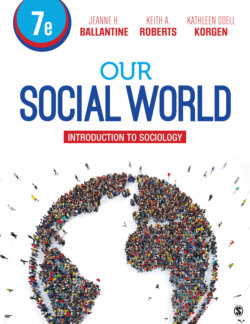Читать книгу Our Social World - Kathleen Odell Korgen - Страница 84
На сайте Литреса книга снята с продажи.
Feminist Theory.
ОглавлениеFeminist theory also uses multilevel analysis and has foundations in the conflict perspective. Feminist theory critiques the hierarchical power structures that disadvantage women and other minorities (Cancian 1992; P. Collins 2008). Proponents note that men form an interest group intent on preserving their privileges. Feminists also argue that sociology has been dominated by a male perspective that does not give a complete view of the social world.
Some branches of feminist theory come from interaction perspectives, emphasizing the way gender socialization, cues, and symbols shape the nature of many human interactions. Thus, feminist theory moves from macro-level analyses (e.g., looking at national and global situations that give privileges to men) to micro-level analysis (e.g., looking at inequality between husbands and wives in marriage). In particular, feminist theory points to the importance of gender as a variable influencing social patterns (Burn 2011; Kramer and Beutel 2014; Lorber 2009; Messerschmidt et al. 2018).
People face inequality due to multiple factors, and it is the interplay of these factors that interests Patricia Hill Collins. An important contemporary scholar, Collins examines the discrimination and oppression people face because of their race, class, gender, sexuality, or nationality, all of which are interconnected. Collins (2008; Collins and Bilge 2016) uses the term intersectionality, meaning individuals have multiple identities (e.g., race, class, and gender) that intersect and impact their lives and opportunities.
▲ Patricia Hill Collins, an innovative feminist scholar, has challenged sociologists to look at the ways experiences of race, social class, gender, and sexuality intersect and reinforce one another.
© Photo courtesy of Patricia Hill Collins
Thinking Sociologically
To what extent are human beings free agents who can create their own social world and come up with their own ideas about how to live their lives? To what extent are our lives determined or influenced by the social systems around us and by our positions in the economic and political system? Is this different for different people, and why?
